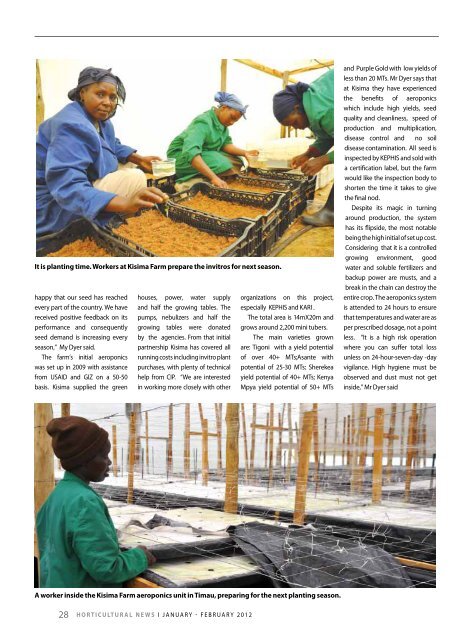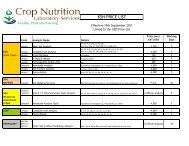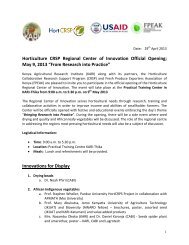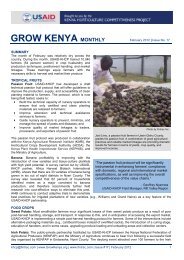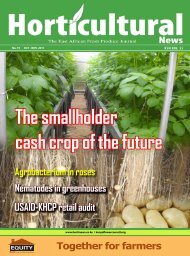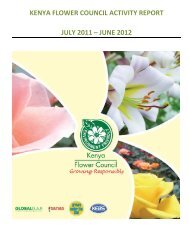Horticultural News January - February issue
Horticultural News January - February issue
Horticultural News January - February issue
You also want an ePaper? Increase the reach of your titles
YUMPU automatically turns print PDFs into web optimized ePapers that Google loves.
It is planting time. Workers at Kisima Farm prepare the invitros for next season.<br />
happy that our seed has reached<br />
every part of the country. We have<br />
received positive feedback on its<br />
performance and consequently<br />
seed demand is increasing every<br />
season,” My Dyer said.<br />
The farm’s initial aeroponics<br />
was set up in 2009 with assistance<br />
from uSaID and GIZ on a 50-50<br />
basis. Kisima supplied the green<br />
28<br />
houses, power, water supply<br />
and half the growing tables. The<br />
pumps, nebulizers and half the<br />
growing tables were donated<br />
by the agencies. From that initial<br />
partnership Kisima has covered all<br />
running costs including invitro plant<br />
purchases, with plenty of technical<br />
help from CIP. “We are interested<br />
in working more closely with other<br />
H O R T I C U LT U R A L N E W S I j a n u a r y - F E B r u a r y 2 0 1 2<br />
organizations on this project,<br />
especially KEPHIS and KarI .<br />
The total area is 14mX20m and<br />
grows around 2,200 mini tubers.<br />
The main varieties grown<br />
are: Tigoni with a yield potential<br />
of over 40+ MTs;asante with<br />
potential of 25-30 MTs; Sherekea<br />
yield potential of 40+ MTs; Kenya<br />
Mpya yield potential of 50+ MTs<br />
A worker inside the Kisima Farm aeroponics unit in Timau, preparing for the next planting season.<br />
and Purple Gold with low yields of<br />
less than 20 MTs. Mr Dyer says that<br />
at Kisima they have experienced<br />
the benefits of aeroponics<br />
which include high yields, seed<br />
quality and cleanliness, speed of<br />
production and multiplication,<br />
disease control and no soil<br />
disease contamination. all seed is<br />
inspected by KEPHIS and sold with<br />
a certification label, but the farm<br />
would like the inspection body to<br />
shorten the time it takes to give<br />
the final nod.<br />
Despite its magic in turning<br />
around production, the system<br />
has its flipside, the most notable<br />
being the high initial of set up cost.<br />
Considering that it is a controlled<br />
growing environment, good<br />
water and soluble fertilizers and<br />
backup power are musts, and a<br />
break in the chain can destroy the<br />
entire crop. The aeroponics system<br />
is attended to 24 hours to ensure<br />
that temperatures and water are as<br />
per prescribed dosage, not a point<br />
less. “It is a high risk operation<br />
where you can suffer total loss<br />
unless on 24-hour-seven-day -day<br />
vigilance. High hygiene must be<br />
observed and dust must not get<br />
inside,” Mr Dyer said


